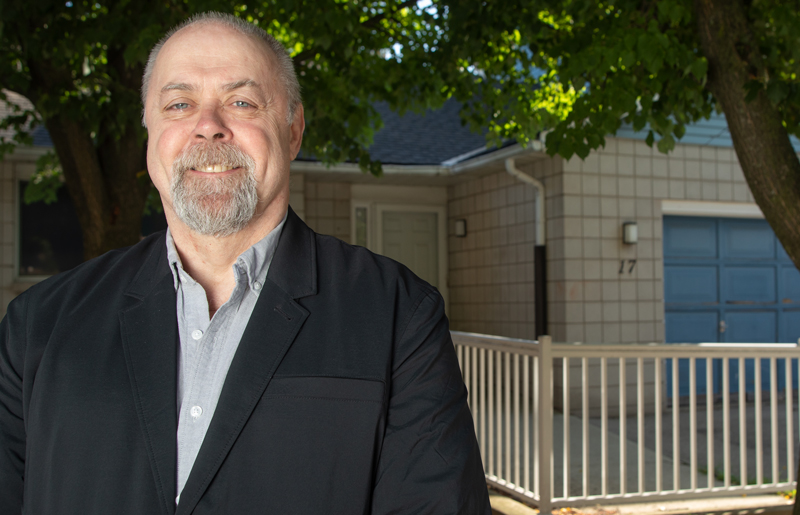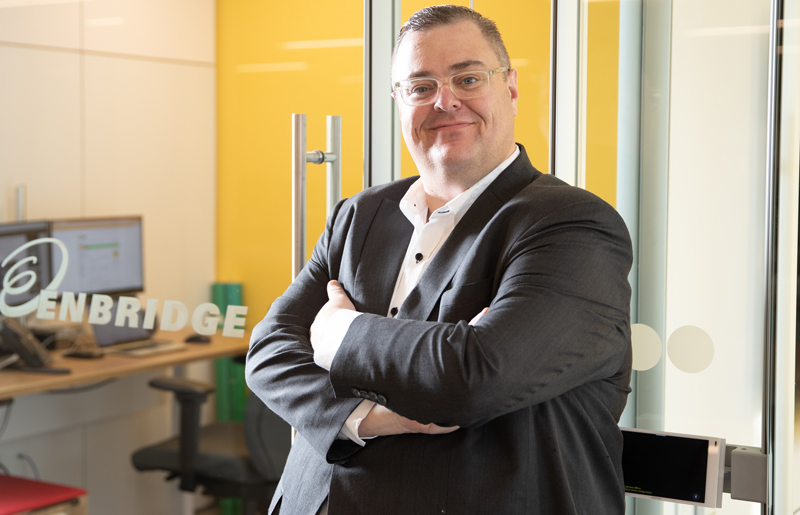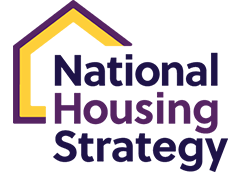Housing provider pivots messaging, gains community support
AT A GLANCE
- Ontario-based non-profit housing provider, Hamilton East Kiwanis Non-Profit Homes Inc. (Kiwanis Homes), was struggling to demonstrate the benefits of new housing to their community.
- Volunteer Canada launched a business advisory program and matched skilled volunteers from Enbridge with Kiwanis Homes to help them with their messaging.
- Following a business advisory session, Kiwanis Homes re-invented their communications strategy and gained community support for 1,000 new affordable housing units.

“We knew we needed to do something, we just weren’t sure what that something was,” says Brian Sibley, executive director of non-profit housing provider, Kiwanis Homes.
Kiwanis Homes provides deeply affordable homes to families in Brantford and Hamilton and had committed to creating 1,000 new units by 2028. But they were encountering resistance from community groups concerned about the impact of affordable homes in their neighbourhood.
“We are building highly efficient, sustainable, secure buildings for families,” says Brian. “Some are rent-geared-to-income, some are mixed income. But we were having issues clearly communicating our mission to staff and to the community.”
You can have the greatest program in the world, but if you can’t communicate it effectively, you will fail
Among the community’s concerns was the assumption that their property values would go down and that crime would increase. Even a supportive local councillor was getting cold feet.
“We didn’t have the internal resources to find a solution,” says Brian.
The timing couldn’t have been better for Brian to receive an e-blast from Volunteer Canada about an advisory initiative with skilled business volunteers.
We wanted to leverage the skills of corporate volunteers to support the affordable housing sector
Volunteer Canada provides leadership and expertise to non-profit organizations, businesses, governments, and educational institutions on volunteerism. They also connect sectors and stakeholders to increase the quality, accessibility and diversity of volunteer experiences.
“We wanted to leverage the skills of corporate volunteers to support the affordable housing sector,” says Maddie Kingston, manager, corporate citizenship at Volunteer Canada.
“The idea was to partner skills-based volunteers from companies with community housing providers to help them deliver on their affordable housing commitments.”
Based on a concept created by Volunteer Ireland, Volunteer Canada pitched the idea for a pilot project to CMHC.
“Non-profit housing organizations face significant capacity challenges, and resources are scarce,” says Regina De La Campa, operational policy analysis specialist, CMHC. “So, when this opportunity came about, we jumped into action. It’s a win-win-win. The volunteers and the participating companies gain awareness of housing issues in their community and get directly engaged in solutions. Non-profits benefit from the volunteers’ expertise, and the community benefits from the housing solutions put in place.”
Next, Volunteer Canada approached its Corporate Community Engagement Council, comprised of more than 20 Canadian companies.
They asked for supporters, with the understanding that if a company stepped forward, they would also provide the funding needed to deliver the initiative.
Three companies offered their support for the pilot initiative—CIBC, Enbridge, and Meridian Credit Union.
As the concept took shape, several objectives were established:
- grow capacity in the affordable housing sector
- generate new supporters for the non-profit housing sector by directly engaging corporate volunteers
- provide companies with new models of engaging their employees with skills-based volunteering
- develop a pilot model that could be replicated and scaled
Creating the framework
The first step was identifying skills gaps across the affordable housing sector.
CMHC connected Volunteer Canada with the Community Housing Transformation Centre. The centre is comprised of a network of organizations and provides access to tools, financial resources and best practices to support the growth, transformation and resilience of community housing.
In addition to providing guidance on the sector’s skills gaps, the centre also helped to spread the word about the project to community housing providers.
“We had discussions with the participating companies to see what in-house expertise they could offer from the gaps the centre identified,” says Maddie. “This provided an ‘areas of expertise’ list from which the community housing providers could select in their application.”
Once applications were received from community housing providers, Volunteer Canada set to work matching them up with the corporate volunteers.

Internal and external synergies
A long-time Enbridge Gas employee with a history of volunteerism, Peter Jurgeneit was keen to respond to the call from Volunteer Canada.
“Volunteerism is a part of our corporate culture,” says Peter who is based in Chatham, Ontario.
In 2021, Enbridge Inc. created the program Fueling Futures to bring together their corporate citizenship, philanthropic and employee volunteer work. The program also enables employees to volunteer during their workday.
To have someone make that connection is awesome. This is an outstanding way to unite different expertise from people who are passionate to help and serve
One of the unique aspects of Volunteer Canada’s pilot advisory program was that it was developed during the pandemic and therefore delivered entirely online. This enabled Enbridge to gather a team of volunteers who not only work in different departments, but different regions.
The 4 volunteers had never worked together before and so the initiative created internal as well as external synergies.
“I bring a technical, engineering and business background,” says Peter. “Others on the team came from marketing and community relations backgrounds.”
Having received the application from Kiwanis Homes, Volunteer Canada arranged an orientation session to dig deeper into their challenge and establish the volunteer skill set needed to address it.
Volunteer Canada matched Kiwanis Homes with Enbridge.
“To have someone make that connection is awesome,” says Peter. “We were eager to offer volunteer support and ideas to a terrific group.”

Organic problem-solving
Volunteer Canada did not prescribe how the volunteers should come up with the solutions.
“We act as a facilitator, using our expertise to right size volunteer assignments to the skills and time available,” says Maddie. “We wanted the process volunteers chose to formulate and deliver their advice to be organic.”
The only caveat was that the volunteers had to deliver their advice in a 2-hour online meeting.
Once the Enbridge team had developed a presentation with their proposed strategy for Kiwanis Homes, Maddie observed the business advisory meeting to verify that everything was on track with the non-profit’s ask.
“I was blown away,” she says. “It was such a cohesive team. They approached the challenge in a respectful and attentive manner. We were witnessing volunteering in action in such an incredible way.”
A small team with big housing commitments
“You can have the greatest program in the world, but if you can’t communicate it effectively, you will fail,” says Brian.
By the time he saw Volunteer Canada’s e-blast, it had already been 4 years since Kiwanis Homes had asked their community how they improve their service. “The feedback was, you need to give us safe communities, well-maintained communities and be good neighbours. And you need to provide more housing.”
Their challenge was organizational. Brian’s team had a big budget but a small team that lacked the skill set to communicate how they planned to deliver on their housing commitments.
“We are mission focused. We are good at bricks and mortar,” says Brian, who comes from a social work background.
“I’m not a marketer, a fundraiser, or even a developer/builder. I understand the people side of things,” he acknowledges.
Trusted space leads to candid communication
Maddie observed as the process came together. “The volunteers were learning about everything the housing providers were doing, and it created this really nice atmosphere of camaraderie and support. Some volunteers were aware of the organization, and some weren’t. But they became cheerleaders.”
Enbridge was excellent. That 2-hour mentorship obviously reflected dozens and dozens of hours that they put in
The openness and transparency expressed by the Kiwanis Homes team was greatly appreciated by Peter during the consultation.
“They really led with their heart,” he says.
“It was clear that what they were trying to do was very giving in nature, in trying to serve their community. I think the permission created by the group to invite a critique is courageous. We had diversity of thought in a trusted space and were given permission to be radically candid.”
“Enbridge was excellent,” says Brian. “That 2-hour mentorship obviously reflected dozens and dozens of hours that they put in.”
Peter feels he and the team got more out of it than they put in.
“It was a line of sight to another part of the community that we may not see in our day-to-day roles. In connecting with Brian and the others and hearing what they do, you learn so much.”
Immediate and sustained impact
From Brian’s perspective, the impact was much bigger than anticipated.
“One month after our meeting with Enbridge, we invited one of the community groups and the councillor to a meeting and laid out our plans,” says Brian. “I took the notes from our meeting.”
They emphasized a mutual desire for community safety, sustainable development and increased property values for residents.
“We focused on what we shared with the community and re-framed ourselves as investors, rather than seekers of investment,” says Brian.
“The councillor went from being ambivalent to supportive of our plans,” he continues. “We’ve since had 2 more projects unanimously approved at both the committee and council levels and there has been little in the way of community resistance.”
Kiwanis Homes has also re-branded. They have a new logo and new signage on their units.
“We are re-designing our web site and we’re using the messaging that Enbridge provided to do that.”
One month after our meeting with Enbridge, we invited one of the community groups and the councillor to a meeting… We re-framed ourselves as investors, rather than seekers of investment
They have re-worked their entire communications strategy – all changes that were sparked by the business advisory.
“We’re putting ourselves out there more, inviting questions and making more use of social media.”
Brian is also seeing the impact on other areas of their business.
“We’re making sure to reach out to the right partners that can help push us forward.”
It’s been a paradigm shift and Brian says one of the key benefits is that the program was knowledge and skills-based, rather than work-for-hire.
“The volunteers gave us knowledge and enabled us to increase our internal capacity. But they weren’t doing the work for us, and the 2-hour time limit meant that it wasn’t long enough for us to create a dependency.”
Scaling the program
Volunteer Canada’s pilot program included 11 volunteers across the country and 58 volunteer hours. The feedback on the program from participants was overwhelmingly positive and Volunteer Canada is now scaling the program across Canada.
Enbridge and Kiwanis Homes have both returned for the second round.
“We talk about a housing crisis and in Hamilton especially, there’s lots of challenges,” says Brian. “But without the federal government and the National Housing Strategy, there’d be no hope. I’m not sure there would have been a path forward. The Volunteer Canada program is another example of that. It’s about building industry capacity.”
KEY FACTS
- The corporate volunteer initiative was funded by CMHC in association with CIBC, Enbridge and Meridian Credit Union.
- The initiative represents a collaboration between CMHC, Volunteer Canada, Community Housing Transformation Centre and corporate partners, CIBC, Enbridge and Meridian Credit Union.
- The initiative was developed in support of CMHC’s 2030 aspiration that “By 2030, everyone in Canada has a home that they can afford and that meets their needs.”

